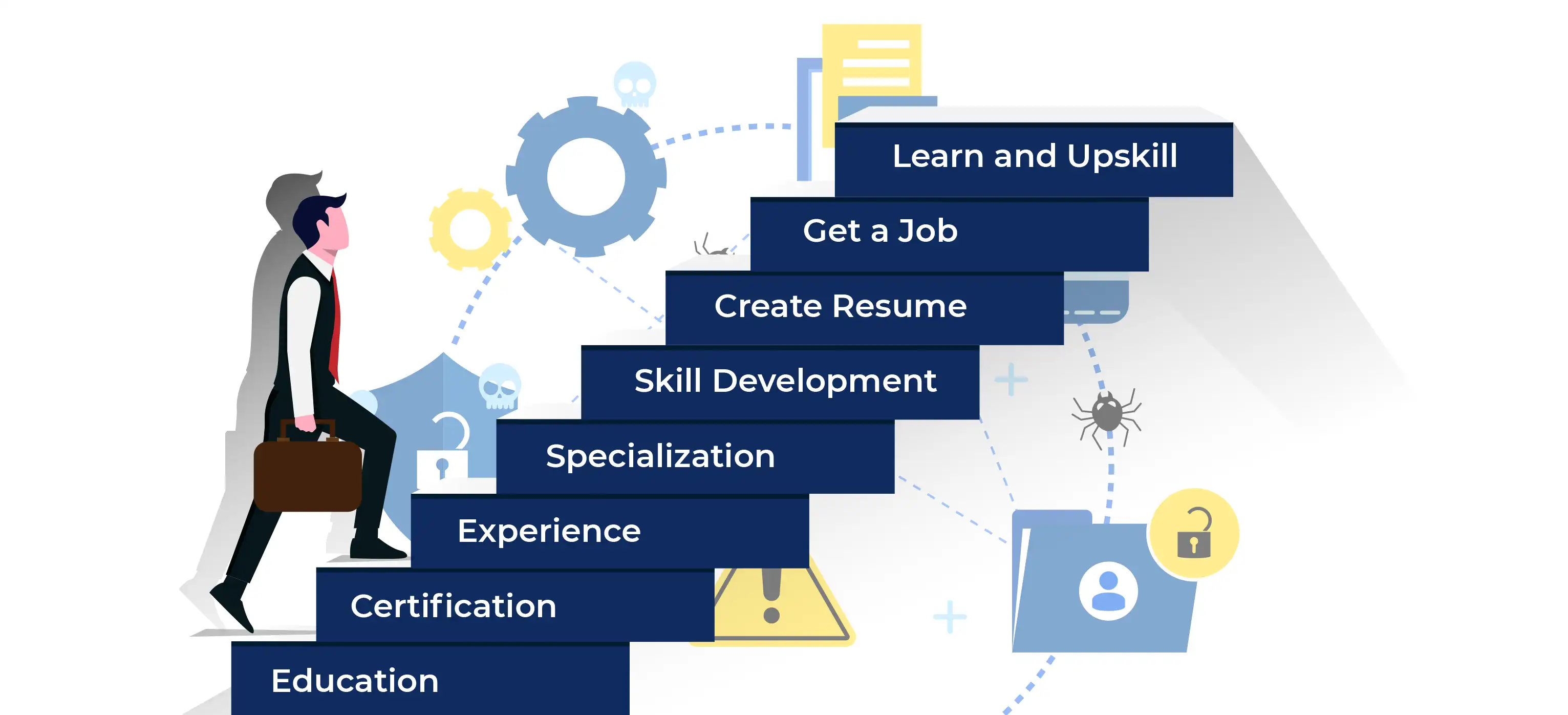 Satendra K
Jan 17, 2025
Satendra K
Jan 17, 2025

Becoming a cybersecurity professional is a rewarding career choice in today’s digital world. To start your cybersecurity career, it is important to have a strong understanding of computer networking and operating systems.
After earning your degree, enhance your credentials by obtaining key certifications such as CEH v13 and CompTIA Security+. Staying informed about the latest cybersecurity trends is also essential to excel in this ever-evolving field.
Follow these ten steps to embark on your journey toward a successful career in cybersecurity:
Ready to dive deeper? Let’s explore each of these steps in detail!
The cybersecurity profession starts with completing the required formal education from a recognised university. Have a look at the detailed description of the 10 steps to become a cybersecurity professional.
The cybersecurity profession starts with completing the required formal education from a recognised university.
Formal educational requirements for a cybersecurity professional vary depending on the job role or organisation where you intend to work. To start a career in cybersecurity, one must primarily meet the necessary educational qualifications. It is to be noted that, Some cybersecurity career requires;
Industry-recognised cybersecurity certifications will help you strengthen your resume and give you a competitive edge over others in the job market. Once you finish your formal education, pursue entry-level cybersecurity certification.
There is a wide range of cybersecurity certification courses for freshers in cybersecurity. A foundational cybersecurity training starts with the strategies and management of cybersecurity tools. You can pursue the following foundational/ entry-level cyber security certification to kick-start your professional journey:
Certified Cybersecurity Technician (CCT) is an entry-level cybersecurity certification by EC Council. Joining CCT Training will help you gain practical skills in ethical hacking, digital forensics and network security. This certification provides foundational knowledge and skills to pursue advanced-level certification.
CompTIA Security+ is a globally recognised certification that validates your skills to start your cybersecurity career. CompTIA Security+ Certification is beneficial in acquiring skills to secure hybrid environments like cloud and IoTs. You will also learn to identify and analyse different types of malware attacks.
Joining the CompTIA Security+ Course will help you receive effective training to prepare for the CompTIA Exam. You can also pursue CompTIA Certifications like CompTIA A+, CompTIA Network+, and CompTIA Cloud+ to strengthen your skills.
Read more to know about the benefits of CompTIA Security + Certification for Cybersecurity Professionals.
The CEH v13 course is the perfect way to build your knowledge and understanding of the latest tools and techniques used for ethical hacking. CEHv13 Training will teach you ethical hacking skills to become job-ready.
The latest version CEHv13 will help you master AI-powered tools to combat cyber attacks. You will learn how malicious attackers exploit the vulnerabilities and help you master tools that secure your networks, applications, and other assets.
If you want to start your career in Network Security, Cisco Certified Network Associate (CCNA) Certification is the best choice. CCNA Certification validates your skills in networking technologies and security to become a CCNA Professional.
Joining CCNA Training will help you master network security management and achieve the best results for the CCNA certification exam. Getting CCNA Certification enables you to start your career as a Network Security Engineer. As per Edoxi’s latest findings on 2025 cybersecurity job trends in the Middle East, Network Security Engineer has the second-highest cybersecurity job demand in the Middle East.
Networking with cybersecurity professionals will help you create long-lasting professional relationships and learn more about what it's like to work in cybersecurity.
You can look for local groups or communities, or connect with people online through social media and LinkedIn. Here’s how you can build a professional network through LinkedIn:
After pursuing relevant cybersecurity certification and acquiring essential industry knowledge, you can choose an area of specialisation according to your interest and expertise.
Knowing industry requirements and job relevance before entering a cybersecurity career is important. Here is what Lori Crooks CEO of Cadra has to say about staying job-relevant in cybersecurity,
“With AI continuing to advance, one cybersecurity job at risk of becoming obsolete is the manual threat detection analyst. Additionally, ethical hacking, red teaming, and threat-hunting fields requiring creative problem-solving are less likely to get replaced by AI.
Focusing on cybersecurity strategy and leadership is another way to future-proof your career. Areas that intersect with business strategy, regulatory needs, risk tolerance and human decision-making will remain relevant.“
Once you get the clarity and decide upon the area of specialisation, the next crucial step is to apply for internships and entry-level jobs. When you start working in an organisation you will gain essential experience and knowledge about the roles and responsibilities of cybersecurity professionals.
While choosing the organisation for your internship or entry-level job, you should consider these factors,
Once you get into a cybersecurity career, the next thing you should focus on is refining your skills. Other than cybersecurity skills, a cybersecurity professional also has to develop soft skills. Joining soft skill training will enhance your soft skills and help you survive in the competitive work environment.
| Hard Skills | Soft Skills |
| Ethical Hacking | Communication |
| Penetration Testing | Critical Thinking |
| Cloud Computing | Decision Making |
| Networking | Problem-solving |
| Programming & Coding | Leadership |
| Digital Forensics | Documentation |
| Security Incident Handling & Response |
Crisis Management
|
| Malware Detection & Prevention |
Observation & Analytical Skills
|
| AI & Machine Learning |
Risk Management
|
To advance in your Cybersecurity Career, you need to build a resume that stands out. The resume needs to be clear and concise, and it should highlight your skills and experience. It shows potential employers that you have the eligibility to do the job. Here is what a cyber security resume must include:
You can also seek the help of professional experts to build a catchy resume.
Getting a job is just the beginning of your professional journey in cybersecurity. Once you have a job, staying updated with the latest cybersecurity trends is important. Follow these tips to stay updated on cybersecurity,
If you are based in the Middle East, have a look at Edoxi’s Report on 2025 cybersecurity job trends in the Middle East.
Once you have your job position secured, it's time to think about ways to upskill and improve your career. One great way to do this is by getting higher-level cybersecurity certifications.
These certifications can show your employer that you are serious about continuing your education and expanding your skill set in cybersecurity. Here are some of the best cybersecurity certifications that you can pursue as a part of the continuous learning process,
The CISSP Certification course provides knowledge on solving primary security problems such as application development security, mobile security, cloud computing, and more.
Enrolling in the CISSP course is the first step towards becoming a Certified Information Systems Security Professional. As a part of the training, you will learn about elements that can minimise security threats and master techniques for identifying network-based attacks.
CISM Certification validates in-depth skills in 4 domains; Security program development and management, Security governance, Security incident management, Risk management and compliance.
The CISM course gives an in-depth understanding of external & internal audits, that will help you become a Certified Information Security Manager.
CCSP Certification validates skills in identifying strategies for categorizing data, supervising agencies, making sure privacy is established, and protecting the data effectively. Data security experts with a minimum of 5 years of IT experience can pursue the CCSP course.
CISA Certification gives credibility to your in-depth understanding of security auditing of information systems. The CISA course is specifically for cybersecurity consultants, security audit managers, and IT auditors.
The Certified Network Defender (CND) Certification emphasises skills in detecting, safeguarding, and reacting to network threats. The CND course is specifically designed for Network Administrators, Network Defense Technicians, Security Analysts, Network Security Administrators and Network Security Engineers.
CHFI Certification validates your skills in cybercrime investigations and digital forensics. The CHFI course is designed for cybersecurity professionals with more than one year of work experience.
CompTIA CySA+ Certification validates your skills in threat intelligence and threat management. The certification exam evaluates your knowledge in Network Security, Cyber Defense and Vulnerability Assessment. The candidates require a minimum of 4 years of work experience as an Incident Handler or SOC Analyst to join the CompTIA CySA+ Course.
There are various top cybersecurity certifications that will contribute to your professional growth and help you with job promotions.
Read Also : A Step-by-Step Roadmap to Passing the OSCP Exam
Once you pass the advanced-level cybersecurity certification you can look for job promotion and higher-level positions like Chief Information Security Officer, Cybersecurity Architect, Senior-level Cybersecurity Engineer etc.
Getting advanced-level cybersecurity certification will give you the confidence to apply for high-paying jobs in well-reputed organisations. It will help you enhance your credibility and contribute to your professional growth.
Chief Information Security Officer, Malware Analyst, Bugbounty Specialist etc. are some of the high-paying cybersecurity jobs that you pursue.
The professional journey in cybersecurity comes with its own set of challenges and requires constant learning. Even after landing a job, you must keep upskilling yourselves to meet the changing cybersecurity industry demands. If you have already reached top position you can upskill your cybersecurity team.
One great way to do this is by earning industry-recognised cybersecurity certifications. Choose the right certification and seek the help of mentors whenever necessary, you are all set for a successful career in cybersecurity.